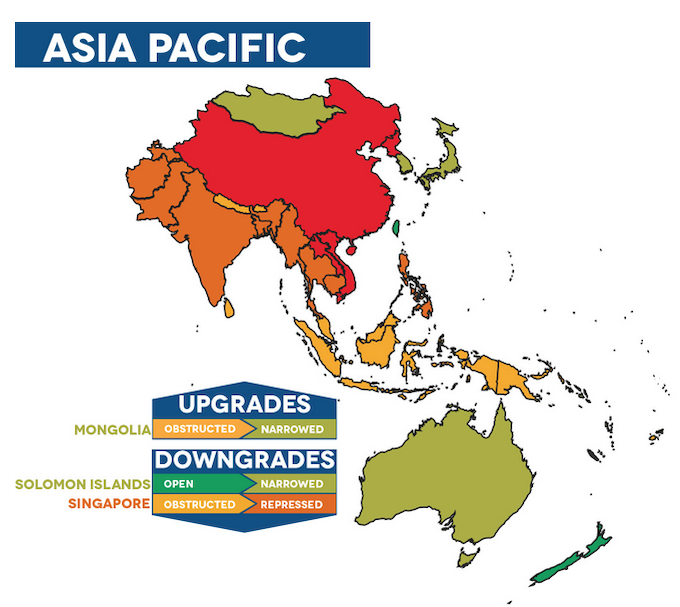By Sri Krishnamurthi for Asia-Pacific Report
The troubled nation of Solomon Islands, whose Prime Minister Manasseh Sogavare won a no-confidence vote 32 votes to 15 with two abstentions on Monday, has been downgraded from “open” to “narrow” in the people power under attack 2021 CIVICUS Monitor report.
While the majority of Pacific countries were rated open, of most concern was the increased use of restrictive laws that blighted the whole region the report released by the international non-profit organisation CIVICUS, a global research collaboration that rates and tracks rights in 197 countries and territories.
The People Power Under Attack 2021 report shows that civic freedoms are routinely respected in over half the countries in this region. Seven countries in the Pacific are rated “open”, the highest rating awarded by the CIVICUS Monitor.
An open rating means people are free to form associations, demonstrate in public spaces, and share information without fear of reprisals.
Concern in the report highlighted those civic rights are not respected across the region; Fiji, Nauru and Papua New Guinea remain in the “obstructed” category, meaning that restrictions of freedoms of expression, association and assembly have been raised by civil society in these countries.
Restrictions relating to media freedoms, access to information and the right to protest led to the Solomon Islands downgrade. Freedom of expression is of particular concern — in early 2021 the cabinet threatened to ban Facebook over worries about posts with “inflammatory critiques of the government”.
The government eventually backtracked after condemnation from civil society and the opposition.
Public Emergency extended
Freedom of assembly have been documented in the Solomon Islands. In July, the State of Public Emergency was extended for another four months in response to covid-19, even though there were only 20 reported cases in the country.
A march in Honiara to deliver a petition to the government by people from the Malaita province was disrupted and dispersed by the police.
Accessing information is not available to the media in the pandemic as Solomon Islands does not have freedom of information legislation. Additionally, the environment towards civil society groups is becoming more hostile in the country.
For example, in late 2019 the office of the Prime Minister called for an investigation into a number of civil society groups after they called for the prime minister to step down.
“Excessive restrictions on civic freedoms imposed by the government under the guise of preventing covid-19 led to the downgrade of the Solomon Islands. Constant threats to ban Facebook and attempts to vilify civil society have also resulted in the failure of the Solomon Islands to retain a top spot in our global rights rankings,” said Josef Benedict, Asia-Pacific civic space researcher at CIVICUS.
The use of excessive restrictions against activists and critics was the leading violation in 2021 with at least seven countries having been found to have transgressed in the report.

Target on Fiji journalists, activists and critics
In Fiji, provisions relating to sedition in the Public Order (Amendment) Act 2014 have been used to target journalists, activists, and government critics, while other sections of the act have been used to arbitrarily restrict peaceful protests.
The Fiji Trade Unions Congress (FTUC) was denied a permit to hold a rally in Suva, on International Labour Day, 1 May 2021 — no reason, written or verbal for the rejection was given.
The use of restrictive laws is a concern across the Pacific. New criminal defamation laws passed in Vanuatu and Tonga cast a chilling blow to freedom of expression.
In Australia, the government continues to hound whistleblowers through the courts, as seen in the case of Bernard Collaery, the lawyer of an ex-spy, who was charged with allegedly exposing Australia’s bugging of Timor-Leste.
In 2019, Australia was downgraded by the CIVICUS Monitor due to attempts to silence whistleblowers who reveal government wrongdoing, among other concerns.
New Zealand and Australia, which was downgraded in 2019, did not get off scot-free. The UN Special Rapporteur on the rights to freedom of peaceful assembly and of association said the pandemic was not reason enough to quell peaceful assembly of protesters.
Indeed, protesters to the lockdown rules were detained this year for violating covid-19 rules.
Intimidation of Pacific activists
Other civic rights violations highlighted by the CIVICUS Monitor include the harassment or intimidation of activists and critics across the Pacific, as documented in Fiji, Samoa and Papua New Guinea.
Fijian surgeon Dr Jone Hawea was detained for questioning after criticising the government’s response to covid-19 in his Facebook live videos, while Papua New Guinean lawyer Laken Lepatu Aigilo was allegedly detained and assaulted by police in April 2021 after lodging an official complaint against a politician.
“The state of civic space in the Pacific may seem relatively positive. However, over the year we have seen restrictive laws being used in several countries, including criminal defamation laws. Protests have also been denied or disrupted under the pretext of handling the pandemic, while activists have faced harassment and intimidation,” said Benedict.
However, there have been some positive developments this year. After strong civil society pressure, Tongan authorities moved swiftly to charge the alleged murderer of leading LGBTQI+ activist Polikalepo “Poli” Kefu, after his body was found on a beach near Tongatapu, Tonga’s main island
More than 20 organisations collaborate on the CIVICUS Monitor to provide an evidence base for action to improve civic space on all continents.
The Monitor has posted more than 500 civic space updates in the last year, which are analysed in People Power Under Attack 2020.
Civic space in 196 countries is categorised as either closed, repressed, obstructed, narrowed or open, based on a methodology which combines several sources of data on the freedoms of association, peaceful assembly and expression.
Article by AsiaPacificReport.nz







